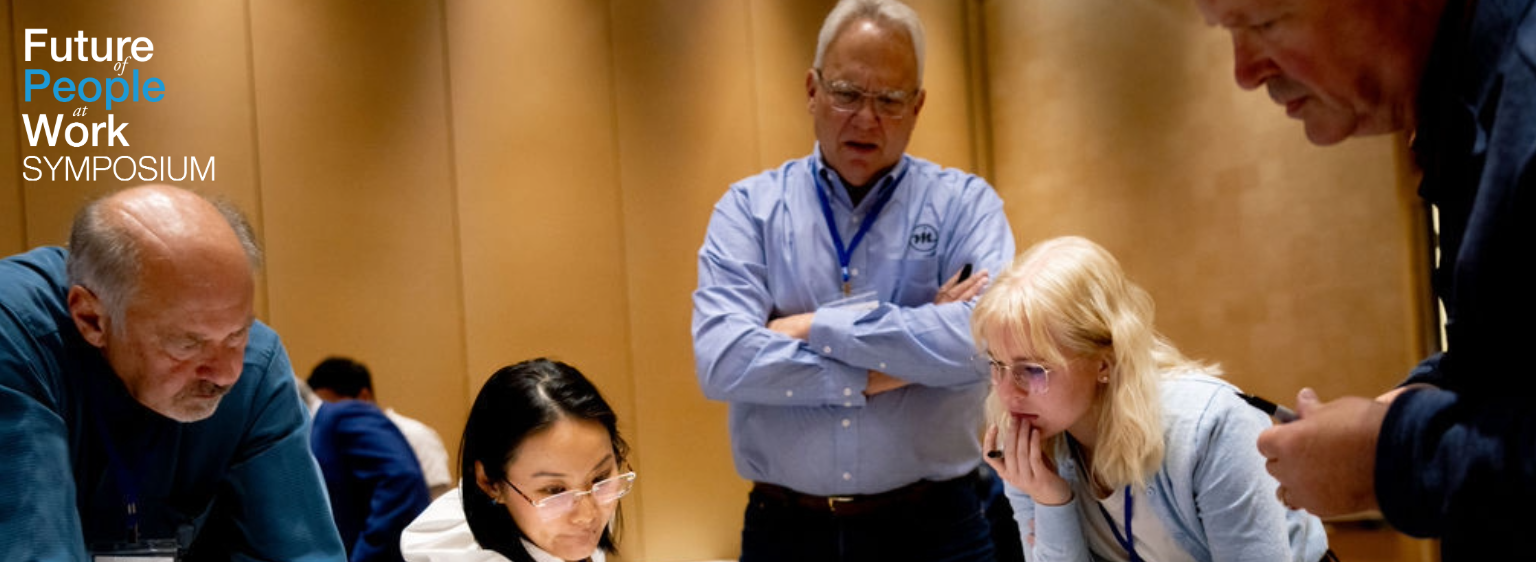By Future of People at Work Symposium Participants and Claude AI*
Kelly Marlow, AVP of Digital Workplace Experience at Nationwide, set the tone for this discussion with her insightful presentation on adapting to new work environments. “We have this ability for people to work anywhere… and that’s the challenge that we’re faced with right now,” Marlow observed. This reality of remote, hybrid, and flexible work environments has profound implications for Lean implementation, which traditionally relied heavily on in-person observation and collaboration.

Marlow’s team at Nationwide has been at the forefront of addressing these challenges. They’ve developed a data-driven approach to understanding and improving the digital workplace experience, using a 1-5 scoring survey and freeform commentary to collect employee feedback. This data is then used to create digital journey mapping for different roles, providing insights on digital behavior and guiding technology planning and purchases.
“Our leadership cares about the workplace experience that our employees are having, and that investment is really making a difference,” Marlow explained.
Collaborative Exploration: Lean Coffee Insights
During the symposium’s Lean Coffee sessions, participants grappled with several key questions:
- How do we maintain a Lean culture in distributed teams?
- What does “gemba” look like in a digital environment?
- How can we balance the flexibility of remote work with the standardization central to Lean practices?
One group’s discussion led to a powerful insight: “The intersection of digitization and Lean/CI (Continuous Improvement) is where we need to focus.” This sentiment was echoed across multiple tables, highlighting the need for Lean practitioners to embrace digital tools and platforms.

Redefining Gemba in the Digital Age
The concept of “gemba” — going to the actual place where work happens — is fundamental to Lean thinking. But what does gemba look like when work happens in the cloud? Symposium participants proposed several innovative ideas:
- Virtual Gemba Walks: Using video conferencing and augmented reality to observe remote work processes.
- Digital Visual Management: Developing online platforms for Kanban boards, metrics tracking, and team communication.
- Data as Gemba: Recognizing that in knowledge work, data often represents the “actual place” where work happens.
Maintaining Lean Culture in Distributed Teams
The challenge of fostering a Lean culture across distributed teams emerged as a key concern. Symposium participants emphasized the importance of:
- Regular virtual huddles and check-ins to maintain team alignment
- Leveraging collaboration tools for continuous improvement initiatives
- Developing new rituals for remote team building and problem-solving
One group proposed the idea of “virtual obeya rooms” where teams could collaboratively work on problems and track progress, regardless of physical location.
Balancing Flexibility and Standardization
Lean practices often rely on standardized work, but how does this concept apply in flexible work environments? Symposium discussions yielded several insights:
- Develop flexible standard work that accommodates different work environments while maintaining core principles and clear expectations for both outcomes and processes.
- Use technology to track and analyze work patterns, identifying best practices that can be shared across the organization.
Experiments and Next Steps
True to Lean principles, the symposium didn’t just discuss ideas—it generated actionable experiments. Some proposed initiatives included:
- Piloting a “hybrid” program that combines in-person and virtual Lean activities
- Developing a toolkit for “remote kaizen events”
- Creating a community of practice focused on Lean in flexible work environments
One particularly exciting idea that gained traction was the concept of “micro-learnings” tailored for distributed teams. As an attendee explained, “We need to adapt our training and development approaches to match the new ways people are working.”
*This series is the product of a novel collaboration between human insight and artificial intelligence. Content is derived from the collective contributions of the 150 attendees of the Future of People at Work Symposium, processed and structured by Claude.AI 3.5 Sonnet, and curated by Eric O Olsen Director – Central Coast Lean, one of the Symposium collaborating organizations.*
Future of People at Work Symposium
This unique event brings together practitioners, leaders, and thought pioneers to shape the future of work through collaborative problem-solving and shared learning.




